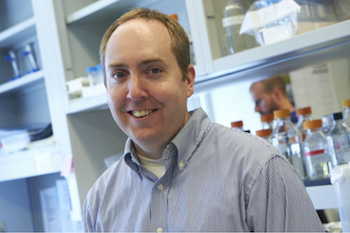 |
|
| Cole Haynes, PhD |
Cole Haynes, PhD, associate professor of molecular, cell & cancer biology, was named one of 84 faculty scholars by the Howard Hughes Medical Institute (HHMI), the Simons Foundation, and the Bill & Melinda Gates Foundation. Given to early-career scientists who have great potential to make unique contributions to their fields, Dr. Haynes will receive $900,000 over the next five years as part of the $83 million program.
“I am thrilled and certainly grateful that HHMI, along with the Gates and Simons foundations, have recognized my lab’s work dealing with cellular adaptations to mitochondrial dysfunction,” said Haynes, who recently joined UMMS from Memorial Sloan Kettering Cancer Center in New York City. “The award will allow us to expand our research into how deleterious mitochondrial genomes accumulate and contribute to aging and cancer.”
Haynes studies how cells and organisms adapt to mitochondrial dysfunction. Mitochondria are the cell’s tiny power plants, responsible for many cellular activities, as well as being the primary source of energy for the cell. Breakdown in mitochondrial function is most often associated with the effects of aging, but also plays a role in some metabolic disorders, Parkinson’s disease, bacterial infections and certain cancers. Haynes is investigating the sensors and tools the cell uses to monitor mitochondria and, when faulty, the strategies cells use to ensure cell survival and mitochondrial recovery.
With funding from the faculty scholars award, Haynes will investigate how deletions in mitochondrial DNA, which typically make less than 1 percent of the mitochondrial genome population in a cell, accumulate over time and contribute to aging.
“There aren’t a lot of models for studying this,” said Haynes. “This funding will allow us to take some chances on some long-term projects that we might not have done otherwise.”
“Dr. Haynes’ highly original work on the role of mitochondrial DNA in normal aging and in disease is of keen interest both to basic science and to medicine,” saod Terence R. Flotte, MD, the Celia and Isaac Haidak Professor of Medical Education, executive deputy chancellor, provost and dean of the School of Medicine. “Over time, most mitochondrial gene functions have been superseded by nuclear-encoded genes. The 13 genes whose functions remain encoded in mitochondria are exceptionally critical, or else there would not have been such strong evolutionary pressure for these genes to remain there. This award demonstrates that the best way to cultivate foundational science like this is to invest in scientists like Dr. Haynes.”
HHMI, the Simons Foundation, and the Bill & Melinda Gates Foundation joined forces to create the faculty scholars program in response to growing concern about the significant challenges that early-career scientists are facing. The career trajectory for early-career scientists has become much less certain as competition for grant support intensifies. In the last two decades, the U.S. has witnessed a dramatic decline in the National Institutes of Health research award success rate for scientists, as well as a striking increase in the average age at which an investigator receives his or her first individual grant.
Early-career researchers with more than four, but no more than 10 years of experience as faculty members were eligible to apply for this competition. Distinguished scientists reviewed and evaluated more than 1,400 applicants on their potential for significant research productivity and originality, as judged by their doctoral and postdoctoral work, results from their independent research program, and their future research plans.